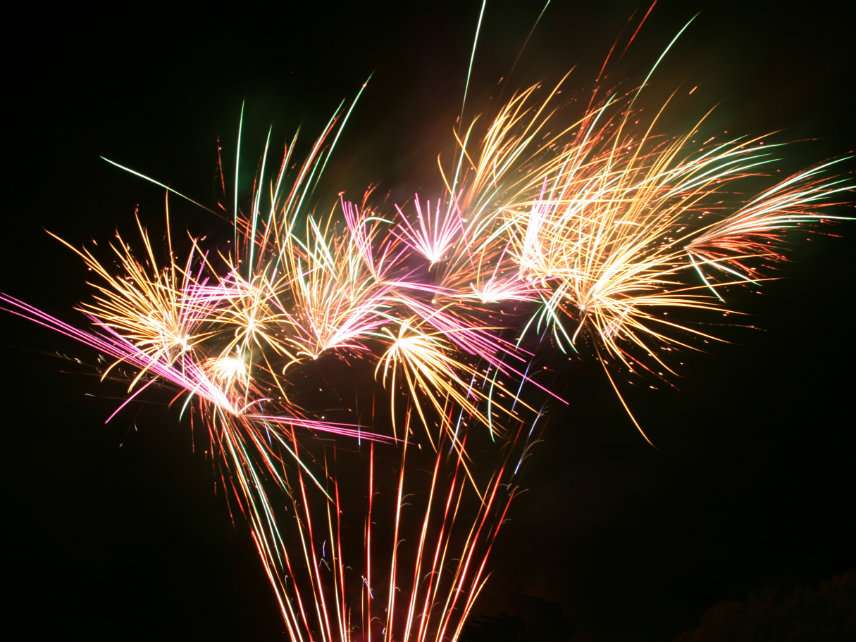Legal or Illegal, Fireworks Are More Available Than Ever
Widespread demand, scofflawry, and loosening laws are making firecrackers, fountains, and bottle rockets easier to get.

One of my fonder childhood memories involves igniting a small batch of home-brewed gunpowder on the windowsill in my bedroom. I had vague plans for making my own firecrackers, or cherry bombs, or maybe a cannon—something that would go BOOM anyway. The stuff worked, though not quite so spectacularly as I'd hoped—fortunately.
Also fortunate is that such DIY efforts are often unnecessary in a country where many states feature booming markets in fireworks for such traditional celebrations as Independence Day. Even better, state fireworks laws have long been as fractured and diverse as Americans themselves are now, guaranteeing that, even if your own chosen address is a bit restrictive when it comes to matters pyrotechnic, a border near you likely offers legal refuge to a variety of loud and flammable goods. Even Americans suffering under the rule of fireworks killjoys often have the means to duck across the state line to acquire something pleasingly pyromaniacal, albeit illegal at home.
Here in Arizona, under pressure from residents who were tiring of driving elsewhere to make their purchases, in 2014 the legislature required the overcrowded hives cities of Maricopa and Pima counties to loosen up a bit and allow the sale and use of a limited range of consumer fireworks—at least at designated times during the year. That means that from May 20-July 6, and from December 10-January 3, you can purchase fireworks including "cylindrical and cone fountains, illuminating torches, wheels, ground spinners, flitter sparklers, ground sparkling devices," as the Phoenix Fire Department details. Allowed all the time are "novelty items" like snappers, poppers, sparklers, and the like. Forbidden all the time are things that shoot into the air, like bottle rockets and roman candles, and items that actually explode, like firecrackers—you know, the fun stuff.
But hey, loosening is loosening.
Arizona isn't the only state to lay off fireworks restrictions. Last year, Scientific American noted a growing trend toward easing rules. "Since the year 2000, 15 states have liberalized their fireworks laws." The end of restrictions in many places has been met with both growing demand and dropping prices, as manufacturers (many in China) step in to satisfy the appetite for flame and noise.
Care to do some shopping? The American Pyrotechnics Association maintains a handy online directory of ever-evolving state laws, so you know how far you'll need to drive to find your desired goods.
Why the trend toward loosening laws? Well, because people obviously enjoy playing with fireworks, and they don't allow lawmakers to thwart that taste for fun. Across the country, pop-up stands with packed parking lots, just across the border from restrictive states, are a common sight.
"We are certainly not driving south on Interstate 85 to cross the border to buy Roman candles — which are legal in that Carolina, but outlawed in ours," Drew Perry wrote tongue-in-cheek for North Carolina's Our State in 2015 "Here, you can buy sparklers, and not much else. There, you can probably buy howitzers."
For their part, Chicago residents head to "about a dozen fireworks shops packed along Indiana's border like a football team's offensive line," the Chicago Tribune reported in 2014. "In the weeks before July 4, they compete for the business of hordes of Chicagoland residents driving across the state line to escape Illinois' ban on consumer fireworks."
We Arizonans may be prohibited from using aerial devices, but they're available across the border in New Mexico, Nevada, and Utah, where they were legalized in 2011. And we have a border with Mexico, where creative, hand-crafted fireworks are a matter of pride, especially in Tultepec. Seriously, there's not much you can't get your hands on in the Southwest, one way or another.
California is so concerned about the cross-border flow of fireworks from jurisdictions where pyrotechnics are legal to a state where pretty much nothing is, that its cops are stopping and searching vehicles at the border. Not that California needs much of a nudge to go into Checkpoint Charlie mode, but it was sky rockets that did the trick, this time. And California cops love to show off their seizures in staged photo-ops, acting like a stack of confiscated flammable fun is akin to smuggled plutonium.
Pennsylvania surrendered to the inevitable last year and legalized the sale, purchase, and use of fireworks "that include firecrackers, Roman Candles, bottle rockets, and similar fireworks that contain a maximum of 50 milligrams of explosive material," according to the state police. Those pyrotechnics previously had to be smuggled into the state, but now are available locally.
You'd think that's be the end of the cross-border trade, but Pennsylvania also slapped fireworks with a special 12 percent sales tax that the industry is challenging in court. That leaves Ohio vendors advertising that their goods are a lot cheaper in the relatively low-tax haven just across the state line.
If only my younger self had known how demand, defiance of the law, and competing jurisdictions would have made fireworks so much more available in the future, I'd…No. Let's be real here. I'd still have set fire to that windowsill.
But you don't have to be me. Even if you suffer under the rule of killjoys, you can leave it to the pros and treat yourself to some smuggled pyrotechnics from a permissive jurisdiction near you.


Show Comments (17)